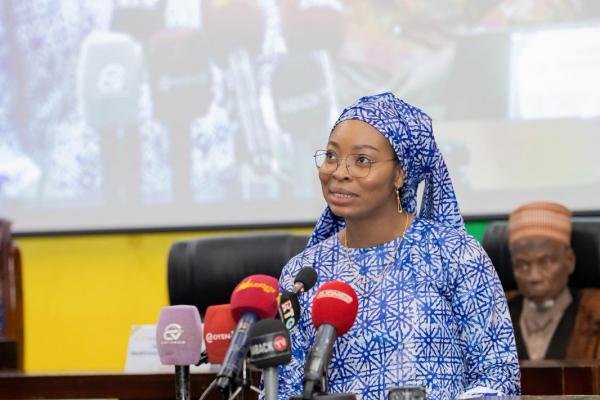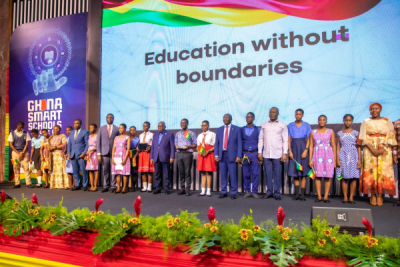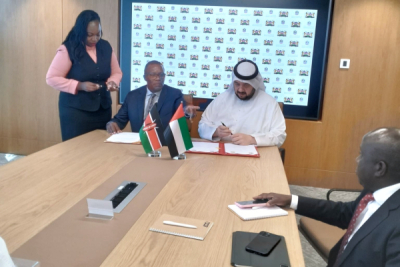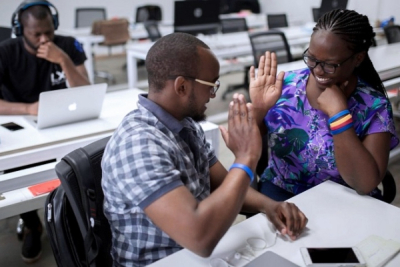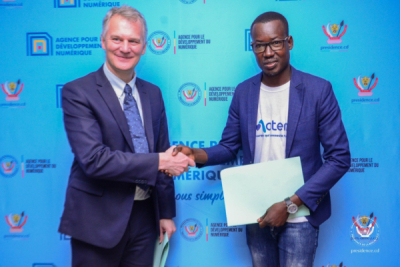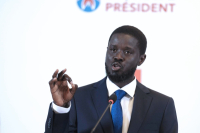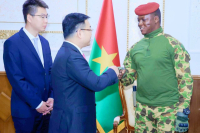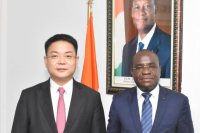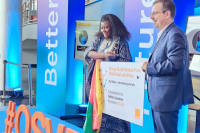
Tech (1149)
Despite the launch of several investment vehicles at the start of the year, investment in African startups continued its downward trend in 2024, following a decline in funding in 2023 compared to 2022.
African startups raised a total of $466 million in the first quarter of 2024, marking a 47% decrease compared to the same period in 2023, according to data released on April 3 by Africa: The Big Deal, a database that tracks funding exceeding $100,000 raised by African startups.
The logistics sector, led by a significant deal involving Nigerian startup Moove, which received a $100 million investment from Uber, surpassed the fintech sector, raising a total of $151 million. Fintech followed closely with $105 million, while the agrifoodtech sector completed the top three with $50 million.
Notably, 87% of these funds were raised by startups from Nigeria ($160 million), Kenya ($108 million), South Africa ($72 million), and Egypt ($53 million). This group, known as the Big Four, continues to dominate the African investment market, while the consistent decline in funding since 2023 has not benefited other technology ecosystems on the continent.
Outside of the Big Four, only four other African countries - Uganda ($16 million), Ghana ($10 million), Tanzania ($9 million), and Morocco ($7 million) - managed to attract more than $5 million in the first quarter of the year.
Adoni Conrad Quenum
Guinea's government is pursuing initiatives to expand high-speed internet access across the country. These efforts may be bolstered by support from partners like the World Bank.
Guinea is set to be connected to a second subsea cable, as announced by Rose Pola Pricemou, the country’s Minister of Posts, Telecommunications and the Digital Economy, on March 26. The move is part of the Western Africa Regional Digital Integration Program (WARDIP), aimed at strengthening Guinea’s digital sovereignty.
“Currently, only one subsea cable connects Guinea to the rest of the world. Through the WARDIP project, we will gain a second subsea cable. It is unacceptable that in 2024, people in the most remote villages cannot access basic social services digitally. Literacy should not be a prerequisite to benefit from public services,” Pricemou said.
The government first revealed its intention to connect to a second undersea cable in February 2022 to bolster the country’s high-speed telecoms infrastructure. Since 2014, Guinea has relied mainly on the ACE (Africa Coast to Europe) cable for broadband services. However, recurrent failures on this infrastructure have disrupted internet service in the country, necessitating a second cable.
The World Bank will finance the future infrastructure under the WARDIP program. In December, the government secured $60 million to enhance internet access. According to the 2022 annual report of the local telecom regulator, ARPT, Guinea has 6.98 million mobile internet subscribers, with a penetration rate of 52%.
The deployment of this second cable is expected to not only boost infrastructure capacity through additional connectivity but also extend these services to millions more people and reduce costs. The project aligns with the government’s digital transformation ambitions.
Samira Njoya
Ghana has recently initiated a comprehensive digitization of its education system, an ambitious project aimed at equipping teachers, revamping infrastructure, and updating curricula to fully leverage the ongoing technological revolution.
Ghanaian President Nana Akufo-Addo officially inaugurated the “Smart Schools” project on Monday, March 25, a move aimed at enhancing e-learning and digitization in the country. The initiative includes the distribution of 1.3 million tablets to secondary school students across Ghana and the provision of teaching and learning management systems, digital learning content, and electronic devices to all upper secondary, technical, and vocational schools.
The government has also pledged to build 100 smart schools across the country’s 16 regions, providing a modern learning environment and digital-centric training. The first 30 schools are slated for completion by year-end, with the remaining 70 set to be finished within the next two years.
The project aligns with the National Digitisation Strategy and the Ministry of Education’s digitization program. In 2018, the Ministry of Education partnered with private entities to bolster this initiative. Additional measures to advance digital education in Ghana have been announced, including the training of 100,000 teachers in digital skills in 2022.
The government believes that this project will equip Ghana’s youth to fully engage in the fourth industrial revolution. For Education Minister Yaw Osei Adutwum, “the application of technology in education should improve student engagement, motivation, and teacher-student interactions.”
“We are committed to ensuring that by 2030, we build and upgrade education facilities that are child, disability, and gender sensitive and provide a safe, inclusive, and effective environment for all,” he added.
Samira Njoya
In Kenya, Information and Communication Technologies (ICTs) have emerged as a significant driver for economic development and job creation. In response, the government is intensifying its efforts to forge partnerships and launch initiatives that aim to bolster the nation's digital capabilities.
On Thursday, March 28, Eliud Owalo, Kenya’s Minister of ICT and the Digital Economy, and Mohamed Hassan Alsuwaidi, the United Arab Emirates’ Minister of Investment, signed a Memorandum of Understanding (MoU) to foster investment cooperation in digitization and technology between their respective countries.
As part of this partnership, the United Arab Emirates has pledged significant investments in Kenya’s ICT sector, with a particular focus on data center infrastructure capable of serving millions of users, as well as artificial intelligence and large language models.
This initiative is a component of Kenya’s Bottom-Up Economic Transformation (BETA) program, which seeks to guide Kenya towards a brighter, more interconnected, and digitally empowered future. This comes shortly after a similar agreement was signed between Kenyan company EcoCloud and UAE-based G42 to establish Kenya’s first geothermal-powered data center.
These data center investments bolster Kenya’s ambition to become a preferred destination for data center providers, in light of the increasing global demand for cloud services. A report by Research and Markets predicts that the local data center market will grow at a compound annual growth rate of 11.22% between 2023 and 2028.
This new collaboration is anticipated to narrow the digital divide in the country, spur technological innovation, and cultivate the emergence of a digital economy. It is also expected to create new job opportunities and provide Kenyan citizens access to the latest digital tools.
Samira Njoya
Disruptive technologies may cause widespread job losses, specialist reports say. The same reports indicate that workforce adaptation is key to mitigating the negative impacts of those technologies.
As Africa’s population surges, creating more and better jobs for its youth is crucial for poverty reduction and wealth distribution, the World Bank stated in its report “Digital Africa: Technological Transformation for Jobs 2023”. The report urges policymakers and the business sector to prioritize digital technology and promote its accessibility urgently to tackle unemployment challenges.
“Africa’s jobs and technology challenges are immense and urgent. Its share of the global workforce is projected to become the largest in the world by the twenty-second century, rising from 16 percent in 2025 to over 41 percent by 2100. More than 22 million Africans between the ages of 15 and 64 join the workforce annually—almost 2 million people per month. This flow of workers is expected to increase to over 33 million per year by 2050,(UN DESA 2022). The imperative is to create good jobs for these millions of young entrants to the workforce and better jobs for today’s workers. Greater adoption of improved and adequate technologies is a critical and underemphasized requirement to meet this goal,” the report states.
The report proposes various strategies and initiatives to better prepare Africa for the future. It emphasizes the importance of promoting the development of digital skills and recommends that African governments invest in digital skills training programs to equip the workforce with the skills needed for the digital economy.
It also highlights the importance of supporting entrepreneurship and encouraging the growth of startups and small technology companies by providing them with access to funding, mentoring, and resources. This can stimulate job creation and innovation in the technology sector.
Improve the ecosystem
The World Bank stresses the need to improve access to technology by promoting access to affordable and reliable internet services, smartphones, and computers. It also calls for implementing policies that support a business environment conducive to technology adoption and innovation, which may involve reducing regulatory barriers, promoting competition, and protecting intellectual property rights.
The report recommends investing in the development and upgrading of digital infrastructures, such as broadband networks, digital payment systems, and data storage and processing systems. It also advocates for collaboration with the private sector, suggesting that public decision-makers establish partnerships with private-sector companies to encourage the adoption of technologies, innovation, and job creation.
Finally, the World Bank believes that by implementing these strategies and working collaboratively, African policymakers can harness the power of technology to improve the lives of their citizens and unlock the continent’s potential for inclusive development.
Muriel Edjo
The Democratic Republic of Congo (DRC) has seen significant growth in its digital inclusion in recent years. This growth is driven by the execution of high-impact projects.
On Saturday 23 March, DRC’s Digital Development Agency (ADN) announced a partnership agreement with local startup Motema, which specializes in the manufacture of made-in-Congo touch-screen tablets, and the French firm KaiOS Technologies, which created the mobile operating system KaiOS.
The initiative aims to set up a mobile phone assembly unit with a production capacity of over one million units, to be sold at a flat rate of 20 dollars per piece.
"Thanks to these low-cost phones, users will be able to explore the digital world, opening the way to new educational, commercial, and social opportunities. It's a revolution in technological accessibility, promising to connect Congolese people to the digital age and broaden their horizons," says an ADN press release.
This new partnership aligns with the National Digital Plan Horizon 2025 (PNN), specifically project 21, which advocates for the development of e-commerce in the DRC. The government reports that 14 projects under the PNN have been finalized, and 25% are nearing operational status, bringing the completion rate to 57%. It also aligns with Motema’s goal of providing every citizen with a cost-effective digital device.
Thanks to this collaboration, Congolese people will have the opportunity to purchase 4G mobile phones for 20 dollars. These internationally standardized phones will provide access to the Google search engine and social networks.
Once operational, the project is expected to create jobs in the DRC and enhance the skills of the Congolese workforce through technology transfer between the two organizations. It also aims to combat the digital divide, foster e-commerce, transform the local economy, and significantly improve the daily lives of the Congolese people.
Samira Njoya
During the tenure of Macky Sall, which commenced in 2012, the digital sector emerged as a crucial catalyst for the acceleration and socio-economic development of the country. His successor aims to exceed these accomplishments in the next five years.
Senegal’s newly elected President, Bassirou Diomaye Faye (photo), has outlined plans to accelerate the country’s digital transformation, a process initiated by his predecessor, Macky Sall. Faye, who was elected on Sunday, March 24, sees digital technology as a catalyst for Senegal’s development.
He announced plans to establish a National Fund for the Development of Research and Innovation (FNDRI) within five years. This fund, which will replace the existing Fund to Promote Scientific and Technical Research (FIRST), will finance startups and research and innovation (R&I) initiatives.
The new administration aims to create an incentivized and secure framework for digital entrepreneurship. The goal is to foster a high-performance national ecosystem that can meet the demand for digital products and services across various sectors of the national economy.
Faye also expressed concern about the impact of digitizing public services on the population. He announced plans for a digitized, high-performance public administration capable of meeting the challenges of the new economy. This includes building sovereign data centers, both public and private, with high-speed internet connectivity and lower hosting charges to consolidate state and local business data.
In the education sector, a national priority, the new President plans to reform the licensing system and establish a monitoring system for private higher education institutions. He also plans to support the development of the Cheikh Amidou Kane digital university, strengthen online course platforms in other public universities, and construct technological universities.
Recognizing that these projects depend on good internet connectivity, the new government plans to ensure internet access throughout Senegal. According to a second-quarter report by the Autorité de Régulation des Télécommunications et des Postes (ARTP), the current penetration rate of broadband internet (3G/4G) is 89.56%.
The primary goal of the investment package announced by the Head of State is to make Senegal a benchmark for digital transformation on the continent by 2029. The digital sector, thriving on constant technological innovation, is one of Senegal’s main drivers of development, contributing over 10% to GDP growth.
Samira Njoya
Amid the ongoing digital transformation, the digital sector has emerged as a significant source of employment. It presents a plethora of job opportunities for the youth. By equipping themselves with the necessary skills, they can capitalize on these opportunities for an easier transition into the workforce.
On Friday, March 22, tech company Huawei announced plans to train over 5,000 young individuals in Burkina Faso in ICT skills within the next five years. The announcement was made by Christophe Liu, the Managing Director of Huawei Burkina, following a meeting with the President of the Transition and Head of State, Ibrahim Traoré, and the Minister of Digital Transition, Posts and Electronic Communications, Aminata Zerbo/Sabane.
“We have come to update the Head of State on the various projects we are implementing. We aim to train the Burkinabe youth in ICTs, including 5G, cloud, and AI. We are initiating a project with the government and the Ministry of Digital Transition, Posts, and Electronic Communications,” stated Liu.
In addition to training, Huawei announced other initiatives, including the installation of a fiber optic cable extending over 2,000 km to provide internet connectivity in the country’s most remote regions. This fiber optic cable will also connect various administrative sectors to enhance communication efficiency.
These initiatives align with Huawei’s commitment to assist the Burkina Faso government in achieving the goals of the national digital economy development strategy, “e-Burkina”. This strategy aims to educate citizens about new technologies, create inclusive and sustainable employment opportunities for the youth, and foster the growth of the digital economy in Burkina Faso.
Samira Njoya
Côte d’Ivoire and China, maintaining a robust bilateral relationship spanning four decades across multiple sectors, have recently chosen to enhance their collaboration in the digital sector.
Chinese tech giant Huawei has pledged to continue its support for Côte d’Ivoire’s digital initiatives. Terry He (photo, left), President of Huawei’s Africa zone, reiterated this commitment during a meeting with Kalil Konaté (photo, right), the Minister for Digital Transition and Digitalisation, and his team in Abidjan on Thursday, March 21.
As per a press release from the ministry overseeing digital affairs, the initiatives include AI and digital technology training for the youth, the construction of digital libraries on a 36-hectare site to accommodate individuals recently relocated from high-risk areas, and the modernization of the Ivorian postal service.
Huawei’s renewed commitment to Côte d’Ivoire is an extension of the tech company’s ongoing efforts in the country. A partnership was established four years ago, in which Huawei agreed to bolster the development of Côte d’Ivoire’s ICT industry and assist in formulating its national digital economy development strategy, “Côte d’Ivoire Numérique 2030”.
The intensification of this collaboration, which has already yielded positive results, is expected to unlock new technological prospects for Côte d’Ivoire, particularly in the areas of rural connectivity, digital infrastructure, and digital inclusion projects. The ultimate goal is to position Côte d’Ivoire as a digital hub in the sub-region.
Samira Njoya
Orange Social Venture Prize in Africa and the Middle East was launched in 2011 by telecom operator Orange. It supports digital entrepreneurs and startups in 17 countries in Africa and the Middle East.
Orange Africa and Middle East has announced the launch of the 14th edition of the Orange Social Venture Prize in Africa and the Middle East (POESAM), according to a press release issued on Thursday, March 21. The competition, which is open for applications until May 26, aims to recognize the best technological projects with a social impact across the 17 countries where Orange operates.
POESAM is conducted in two phases: a national phase and an international phase. In the initial phase, three start-ups are awarded, and a prize for women’s entrepreneurship is given to the top digital project led by a woman. In the international phase, the three winners from each country compete before an international jury, led by Cheikh Tidiane Mbaye.
In a June 2023 interview with We Are Tech Africa, Mbaye discussed POESAM’s impact on technological innovation in Africa, stating, “The prize aids numerous entrepreneurs and startups. It’s not just the POESAM winners that benefit, it stimulates emulation by encouraging a large number of young Africans to take risks. Every Orange company in each of the 17 countries contributes to fostering this innovation and emulation.”
The 13th POESAM’s international grand prize was awarded to Cameroonian start-up Adinkra Jeunesse, which received a cheque for €25,000. The runners-up were Egrobots from Egypt (€15,000) and Smart WTI from Jordan (€10,000). The women’s prize was awarded to Tunisian start-up Bionic Soul. Additionally, the jury’s “Coup de Coeur” prize was given to the Cameroonian startup Services for Aged.
Adoni Conrad Quenum
More...
In recent years, Burkina Faso embarked on a process to clean up its transport sector. The aim is to safeguard government revenue.
The Republic of Burkina Faso launched a platform for authenticating provisional and permanent vehicle registrations on Thursday, piloted by the Ministry of Transport, Urban Mobility and Road Safety. The platform, accessible at www.dgttmverif.bf, is expected to reduce fraud and counterfeiting significantly, according to Roland Somda, Burkina Faso’s Minister of Transport.
The digital tool, open to the public, will allow citizens to ensure their compliance with the law by identifying plates of poor physical quality, false number plates, or plates fitted with false registration documents.
This initiative is a continuation of the 2018 Project to modernize and secure transport permits and re-register vehicles in Burkina Faso. The project’s goal, as stated by the ministry, is “to establish a modern, secure system for producing driving licenses and vehicle registration documents following international standards and in secure ID card format, and to re-register vehicles in Burkina Faso’s fleet.”
The ministry plans to launch a campaign to raise awareness about the use of the new platform.
Melchior Koba
In a bid to diversify its revenue streams and modernize its economy, Congo, like many of its African counterparts, is turning to digital technology. The country is banking on collaborations with seasoned partners in the digital arena to yield positive outcomes in the near future.
U.S.-based Pay Rem Group Inc, a firm focused on modernizing financial services, is set to launch several digital initiatives in the Congo in the upcoming months, in collaboration with the government. A memorandum of understanding was inked on March 18 between the company, Congo’s Digital Economy Development Agency (ADEN), and the Congo Post and Savings Company (Sopeco), aiming to foster digital inclusion and bridge the digital gap in the country.
Héliodore Francis Alex Gouloubi, Managing Director of ADEN, outlined the agreement’s purpose, stating it would facilitate “the execution of a structuring project aimed at enhancing the digital start-up ecosystem through their participation in the operation of certain financial products designed to increase banking penetration.”
The initial phase of the three-way partnership will see the roll-out of several projects in Congo, including setting up a digital bank and a production unit for digital products. The partnership will also ensure the provision of broadband internet services in the country’s remote areas.
This agreement aligns with the Congolese government’s digitization efforts across all key sectors, with a particular emphasis on the financial sector. The modernization of these sectors and the growth of the digital economy represent the fifth pillar of the National Development Plan 2022-2026.
The implementation of projects under this agreement should help to revitalize and reinvent Sopeco, reduce the digital divide, develop financial inclusion for the population, and create jobs, among other things. The aim is to create 3,000 to 4,000 jobs in the first phase of the project and 20,000 in three years.
Samira Njoya
Start-up funding declined in 2023, yet the foodtech sector remains attractive due to innovation potential. In that context, a global competition has been launched to boost startups active in the sector.
Swiss flavor and taste specialist Givaudan and the FoodHack foodtech community announced on March 19 that applications for the foodtech world cup are open until April 11.
The competition aims to leverage local networks to highlight 60 foodtech founders from North America, Latin America, sub-Saharan Africa, Asia-Pacific, Europe, North Africa, and the Middle East on a global stage to boost their growth.
“We hope to discover groundbreaking solutions created by exceptional and entrepreneurial founders that have a tangible impact on a healthier and more sustainable future for all,” said Alexandre Bastos, Head of Open Innovation and Venture Capital at Givaudan, about the partnership with FoodHack and HackSummit.
After their pitch presentations, two solutions from each region will be selected to participate in the competition’s final in Lausanne, Switzerland.
Adoni Conrad Quenum
Africa's rapid technological growth underscores the need to educate young people about online risks and promote safe internet use. Organizations are working to provide safe access to digital opportunities for African youth.
The Women, Gender, and Youth Directorate (WGYD) of the African Union Commission and TikTok, the popular short video sharing app, have recently entered into a partnership. The collaboration aims to promote digital safety on the internet through the “SaferTogether” campaign, targeting teenagers, teachers, and parents.
As part of this initiative, educational videos on online safety, along with content creator recommendations, will be published on TikTok. Additionally, TikTok and the African Union Commission will distribute digital safety toolkits to assist teachers and tutors in addressing key digital safety issues. These resources will be available on a dedicated microsite on TikTok, serving as an interactive guide for safer online practices.
This campaign is a component of the African Union’s Digital Transformation Strategy for Africa and its “1 Million Next Level” initiative. The goal is to enhance young people’s access to digital platforms and promote their safe use to mitigate internet-related risks.
The partnership is expected to equip young people with the necessary tools and confidence for safe internet surfing, fostering a more inclusive and safer online community for young Africans. Nonkululeko Ngwenya, Head of the African Union’s WGYD, stated, “While access to internet can help children and young people stay connected, improve their digital literacy, and diversify their livelihoods, it is crucial that they are provided with a safe environment to reap the benefits of digital platforms.”
Samira Njoya



